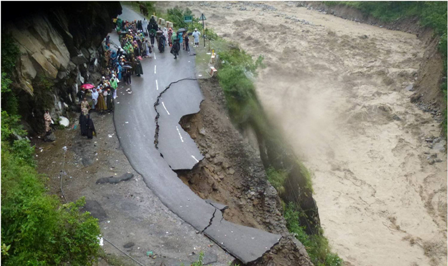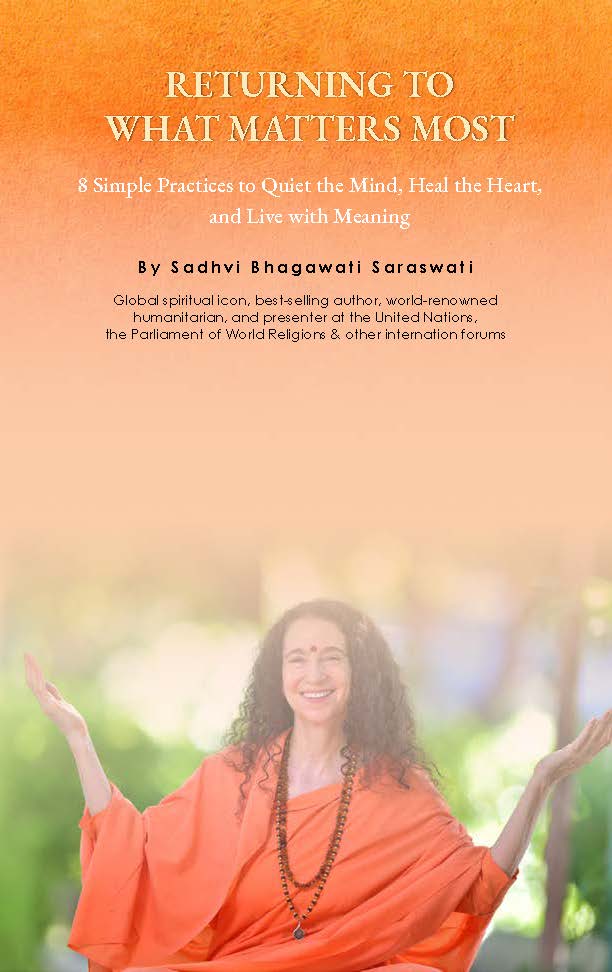
“Overwhelmed By Ma Ganga”, The Speaking Tree
This article was published in The Speaking Tree, here.
THE UTTARAKHAND flood tragedy has taken the lives and livelihoods of tens of thousands of people, even as a debate rages on — is Ma Ganga’s ‘fury’ natural or aggravated by human intervention?
SADHVI BHAGAWATI of Parmarth Niketan, Rishikesh, has been living on the banks of the Ganga for almost two decades now. Here’s what she has to say.
The rains began as we sang our evening aarti; it poured down in sheets as we clapped and chanted euphorically. Mother Ganga flowed below us and next to us, and rained upon us as Akaash Ganga from Heaven. We were soaked from the inside out with gratitude, love and devotion. The monsoons had started, bringing the nectar of rain to the parched soil, to our parched mouths and spirits.
The next morning, we awoke to the precious, delicious fragrance of hot Himalayan soil saturated by cool Himalayan showers. Yet, upon catching a glimpse of Mother Ganga, I realised this was not just any rainstorm. Within 24 hours, the water level had risen more than 15 feet and had showed no signs of ceasing. Excitement, exuberance and awe filled my heart as I went out to offer my morning prayers to Ganga.
“Ganga is rising, Ganga is rising,” was the ubiquitous chant all day in the ashram, but it was still filled with joy, reverence and awe. Our hearts pounded with excitement and devotion. Her glories, grandeur, and divinity were filling more and more of the river bed; more of our hearts, our minds, our beings.
The evening aarti had to take place in the street next to the ghat, as the ghat had flooded. Hands folded in prayer, we performed aarti to Ganga’s now raging glory as she paid no heed to anything that thwarted her flow — the animate and the inanimate, the large and the small. She carried it all in her waters, seizing the aviral flow environmentalists had been demanding. No conference, meeting, agreement, anshan, or contract could now deprive her of her right to flow, and overflow, through her natural river bed, tearing by the root and the foundation of anything that stood in her way.
All the symbols of our ‘progress’, of man’s triumph over nature — highways, cars, trucks, buildings precariously defiant on mountaintop ledges — with one wave of her hand, the illusion was shattered, and the truth of nature’s power was laid bare, undeniable, non-negotiable, for all to behold and mourn.
As the sun set beyond Mother Ganga’s turbulent waters, her waves crashing now like a storm at sea, a moment arose in which the rising surge of bhaav or devotion reached its peak and was transformed, almost imperceptibly, into a swell of bhaya or fear.
“Oh Ma Ganga,” hearts now beating rapidly in apprehension rather than awe, voices trembling with more fear than faith, we prayed: “Please calm your tumultuous flow. Permit us please, O Mother Ganga, to hold onto our delusion of invincibility, our illusion of control over nature, our megalomania, our blind race for development. Please Ma Ganga, allow the curtain of illusion to drop back over our eyes so that we may not be forced to see, to realise your true nature as a river with rights, as a goddess who will wrest those rights from the hands of her captors.
“Ma Ganga, the giver of life, the giver of liberation, whom we have abused, used, disregarded, and turned into a commodity in the name of progress, please have mercy upon us, your children who have promised time and again to preserve you, and yet who time and again, have neglected to do so.”
But, our chances had been used up. Year after year, Ma Ganga had tried to warn us — first at Uttarakashi, then at Rudraprayag; year after year breaking bridges, overflowing banks, demolishing buildings, roads and lives. Voiceless, she had used every means in her hands to make us understand. Yet, blinded by our own agenda, foolish in our wisdomless knowledge, reckless and deluded, we ignored her message — again and again.
We have deforested her hillsides, blasted her fragile, young, soft mountains, encroached further and further upon her banks, dammed and diverted her flow, dragged her helpless tributaries out of their natural beds into steel tunnels, built non-porous structures in the riverbed, impeding the natural flow of water, polluted the air, melting her glaciers. We have pushed her, pulled her, taunted her and tried to tame her. We have used her, abused her and then, as though redemption were so simple, taken our token dubkis, dips, in her waters.
“Jai Gange” we chant as we bob in and out of her waters, feeling redeemed of our sins against she to whom we turn for liberation, redemption, and purity.
Unfortunately the laws of shristi do not bend so easily. Mother Nature provides for us and sustains us as a divine mother, but in accordance with her own laws. If we disobey these laws, we will reap the consequences.
Singing Ganga’s glories or taking dubkis in her waters on auspicious occasions do not render us immune to the laws of Nature. That which we sow, so shall we reap. If we sow unchecked and illegal construction, vision-less development, deceptive politics and pockets lined with commissions — if we sow consumerism as the highest good, we shall reap the fruits of destruction and devastation.
Fortunately, Mother Nature is forgiving. Over time, the rains will dissipate, flood waters will recede, final rites will be performed for those who have perished, the soaked soil will dry and some semblance of normalcy will return to the Char Dham valleys. That is our chance. Perhaps, our last chance. When we make plans for the reconstruction, restoration and rehabilitation of the Uttarakahand mountain villages, what vision of development will we use? What seeds for the future will we sow? Today we are eating the bitter fruit of the seeds we’ve planted for the last few decades. What seeds will we plant today for the fruit of tomorrow?



